
Forced is a single-player and co-op action role-playing game developed by BetaDwarf, released in October 2013 for Windows, OS X and Linux through the Steam platform as well as Wii U. It is about gladiators fighting for their freedom in a fantasy arena where they are assisted by a spirit-like character called Balfus. Gameplay consists of selecting a weapon class and abilities to combat the various enemies of each arena, while solving puzzles using the help of Balfus. BetaDwarf was formed by a small group of students in 2011, who began developing the game in an unused classroom in Aalborg University – Copenhagen, Denmark. They were removed months later and launched a successful Kickstarter campaign involving an Imgur picture which documented their progress. Forced received moderate to favorable reviews with most critics praising its competitive gameplay and puzzle-system. The game's weak plot, technical glitches and excess difficulty were the negative highlights. It won the Intel Level Up 2013 award and BetaDwarf received the Danish Developer Of The Year (2013) for it.
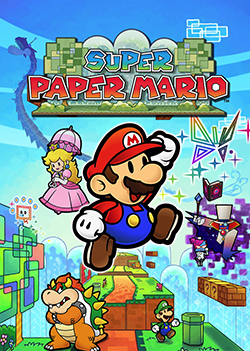
Super Paper Mario is a 2007 action role-playing game developed by Intelligent Systems and published by Nintendo for the Wii. It is the third installment in the Paper Mario series following Paper Mario: The Thousand-Year Door (2004), and the first Mario game on the Wii. The game follows Mario, Peach, Bowser, and Luigi as they attempt to collect Pure Hearts and stop Count Bleck and his minions from destroying the universe.

Phoenix Wright: Ace Attorney – Justice for All is a visual novel adventure video game developed and published by Capcom. It was originally released for the Game Boy Advance in 2002 in Japan, and has since been released on multiple platforms. The Nintendo DS version, initially released in 2006 in Japan, was released in English in the West in 2007. The game is the second entry in the Ace Attorney series, following Phoenix Wright: Ace Attorney.

Phoenix Wright: Ace Attorney – Trials and Tribulations is a visual novel adventure video game developed and published by Capcom. It was originally released for the Game Boy Advance in 2004 in Japan, and has since been released for several platforms, including a Nintendo DS version that was released in 2007 in Japan and North America and in 2008 in Europe. It is the third game in the Ace Attorney series, following Phoenix Wright: Ace Attorney (2001) and Justice for All (2002).
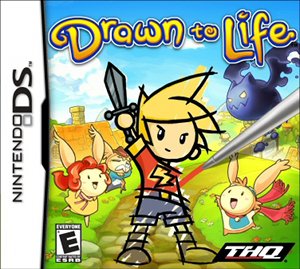
Drawn to Life is an action-adventure platform video game for the Nintendo DS developed by 5th Cell and published by THQ in 2007. It was later published by Agatsuma Entertainment in Japan in 2008 under the name Drawn to Life: God's Marionette, and in Korea under the title Geuryeora, Touch! Naega Mandeuneun Sesang. In the game, the player creates their own playable characters, level objects, and accessories by drawing them using the DS's stylus and touchscreen. The game was ported to iOS by WayForward and released by 505 Games in May 2014.

Mighty Switch Force! 2 is a puzzle platformer developed and published by WayForward Technologies for the Nintendo 3DS. It is the fourth game in WayForward's Mighty series and the sequel to 2011's Mighty Switch Force!. The game was released on the Nintendo eShop on June 13, 2013 in North America and in the PAL regions on June 27. The game was later released for the Wii U in October the same year. A puzzle game using similar elements and assets, Mighty Switch Force! Hose It Down!, was released for iOS on February 12, 2015 and for Microsoft Windows on June 4.
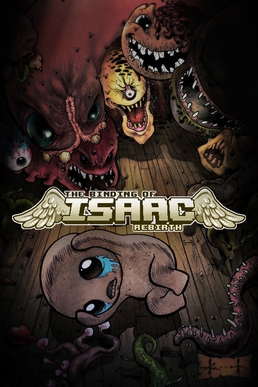
The Binding of Isaac: Rebirth is a 2014 roguelike action-adventure game designed by Edmund McMillen and developed and published by Nicalis. Rebirth was released for Linux, Microsoft Windows, macOS, PlayStation 4 and PlayStation Vita in November 2014, for Xbox One, New Nintendo 3DS and Wii U in July 2015, for iOS in January 2017 and for Nintendo Switch in March 2017. The PlayStation 5 and Xbox Series X/S versions were released in November 2021.
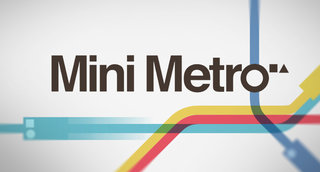
Mini Metro is a puzzle strategy video game developed by New Zealand indie development team Dinosaur Polo Club. Players are tasked with constructing an efficient rail transit network for a rapidly growing city. The game's visual style makes use of bold colours and simple geometry to replicate the appearance of modern transit maps. The game uses a procedural audio system to generate sounds based on the player actions and transit network, with inspiration from works of minimal music.

Fatal Frame: Maiden of Black Water is a survival horror video game developed by Koei Tecmo. The fifth main entry in the Fatal Frame series, it was originally published by Nintendo for the Wii U in Japan in September 2014 and worldwide in October 2015. A remaster for eighth and ninth generation consoles and Windows, this time published by Koei Tecmo, was released worldwide in October 2021.

Sonic Jump Fever was a 2014 vertical platform game developed by British studio Hardlight. It was the sequel to Sonic Jump. The game was made available for iOS and Android systems on 10 July 2014.

Five Nights at Freddy's 2 is a 2014 point-and-click survival horror game developed and published by Scott Cawthon. It is the second installment in the Five Nights at Freddy's series. Set in a fictional pizzeria, the player takes on the role of night security guards Jeremy Fitzgerald and Fritz Smith, defending themselves from the restaurant's hostile animatronic mascots. The player cannot leave their office, but has access to a flashlight and security cameras throughout the restaurant to monitor animatronic activity. Wearing a mask that looks like one of the animatronics allows the player to avoid being detected in most cases, though some animatronics are repelled via other methods. If the player is detected, they will be jumpscared and experience a game over. As the game progresses, Atari-styled minigames and phone calls provide insight into the history of the restaurant.

Lego Jurassic World is a Lego-themed action-adventure video game developed by TT Fusion and published by Warner Bros. Interactive Entertainment. It adapts the plots of the first four films in the Jurassic Park franchise, and is part of a series of Lego-themed video games. The game was released for Nintendo 3DS, PlayStation 3, PlayStation 4, PlayStation Vita, Wii U, Windows, Xbox 360, and Xbox One on 12 June 2015 to coincide with the theatrical release of Jurassic World. An OS X port by Feral Interactive followed shortly thereafter, on 23 July. Lego Jurassic World was later released for Android and iOS on 31 March 2016. A Nintendo Switch version was later released on 17 September 2019.

SteamWorld Heist is a turn-based tactics shooter video game developed and published by Image & Form. The third installment of the SteamWorld series and the sequel to SteamWorld Dig, SteamWorld Heist has the player control Captain Piper Faraday, a smuggler and occasional pirate, as she recruits a ragtag team of robots and sets out on a space adventure. The objective of the game is for players to board, loot, and shoot their way through enemy spaceships.
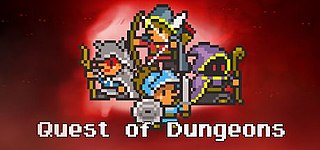
Quest of Dungeons is a roguelike video game released on March 25, 2014 by Portuguese developer Upfall Studios. The game has graphics resembling 16-bit game consoles. It was initially released for Windows, Mac, and iOS, then for Xbox One via ID@Xbox on September 7, 2015. In February 2016, it was announced that the game was being developed for Wii U and Nintendo 3DS and was released on September 29, 2016. It was later released for PlayStation 4 on January 17, 2017. On August 2, 2017, it was announced that it would be coming to the Nintendo Switch.

Road Redemption is a vehicular combat racing video game developed by EQ-Games and Pixel Dash Studios. The game is a spiritual successor to the Road Rash series and was released for Windows PC on October 4, 2017. Console versions of Road Redemption were released on November 6, 2018, for PlayStation 4, Xbox One, and Nintendo Switch.

Flinthook is platform game roguelike by Tribute Games in which the player's character uses a grappling hook to traverse procedurally generated spaceships for treasure. The developers were inspired by "rogue-lites" including Spelunky and Rogue Legacy. They said that the grappling hook game mechanic was their hardest design challenge. The game was released in April 2017 for Windows, macOS, Linux, PlayStation 4, and Xbox One, followed by a release for Nintendo Switch in March 2018. Early previews of Flinthook noted the accessibility and tightness of the controls. Digital Trends and Kotaku listed the game among the best in show at the June 2016 Electronic Entertainment Expo.
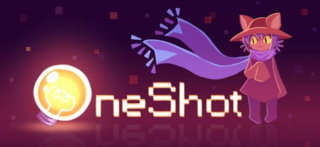
OneShot is a puzzle-adventure game developed by the indie studio Future Cat and published by Degica. Based on a free version made in 2014, it was released for Windows on December 8, 2016. A reworked console adaptation, OneShot: World Machine Edition, was released for Nintendo Switch, PlayStation 4, and Xbox One on September 22, 2022, and for Steam Deck on Steam alongside the original version on September 30, 2024.

Caveblazers is a 2017 video game developed by Deadpan Games and published by Yogscast Games. Described as an "action-focused roguelike platformer", players in Caveblazers defeat enemies across runs of procedurally-generated dungeons to accumulate items, weapons, and potions with random effects. The developers described the design of the game as aiming to "move away from the simplistic combat systems" of other roguelike games to focus on "fast-paced combat". Upon release, the game received generally favorable reviews, with praise directed to the game's roguelike mechanics, customisation and challenging difficulty, and criticism for its lack of variety of environments and enemies. A port of the game for the Nintendo Switch was released in 2019.
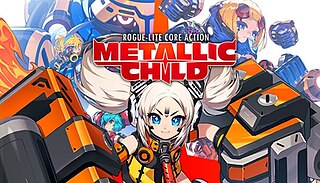
Metallic Child is an isometric action roguelite video game developed by South Korean one-man team Studio HG and published by HIKE. It was released for Nintendo Switch and Windows via Steam on September 16, 2021.

Deeeer Simulator is a 2021 sandbox video game developed by Gibier Games and published by Playism. It was first released for Windows on January 20, 2020, left early access and released for Windows, Nintendo Switch, PlayStation 4, and Xbox One on November 25, 2021. Inspired by Goat Simulator, despite its billing as a "simulator" and the subtitle "Your Average Everyday Deer Game", it is a comedic and surreal game in which the player is reincarnated as a deer and can either explore a stylized city or destroy it using a variety of supernatural powers, such as a stretchy "grappling hook" neck, while looking for hidden secrets. The game went viral for its humorous, unconventional gameplay, but received mixed reviews from critics, who noted its lack of content or goals, describing it as more of a toy.




















